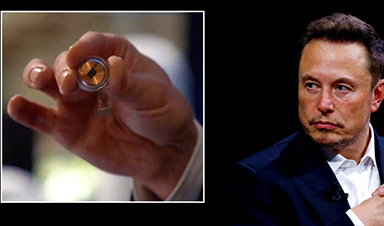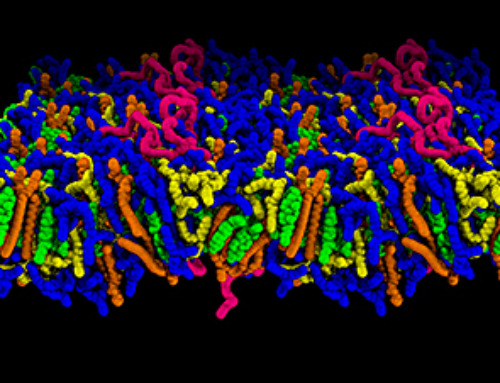Elon Musk has claimed the first human patient implanted with his wireless Neuralink brain chip can move a computer cursor 'just by thinking'.
'Progress is good, and the patient seems to have made a full recovery, with neural effects that we are aware of,' Musk said in a Spaces event X.
'Patient is able to move a mouse around the screen by just thinking.'
Musk said Neuralink, a company working to develop a brain-computer interface (BCI) that can be poked into human brains, is now trying to get as many mouse button clicks as possible from the patient.
Neuralink wedged its first product, called Telepathy, in a person last month.
Musk, the billionaire chief executive of Tesla and SpaceX, said Telepathy's initial users will be those with paralysis.
The dream, Musk says, is to help make phone and computer control possible outside of a lab setting. (Similar earlier tests have involved people being connected to a computer with a cord.)
It's hoped users will be able to control electronic devices 'just by thinking'.
The company does not have approval from the US Food and Drug Administration to sell the device but was given the green light for human trials after officials evaluated its safety risks.
Volunteers for the first human clinical trials are 'open', Neuralink says, for people with limited or no use of both hands due to a cervical spine injury or a neurological disorder that affects nerve cells called neurological disorder that affects nerve cells
'This study involves placing a small, cosmetically invisible implant in a part of the brain that plans movements,' Neuralink's website reads.
'The device is designed to interpret a person's neural activity, so they can operate a computer or smartphone by simply intending to move – no wires or physical movement are required.'
Subjects in the company's PRIME study - short for Precise Robotically Implanted Brain-Computer Interface – have a coin-sized chip surgically inserted by a robot in a part of the brain that controls movement intention.
The tiny computer, called N1, contains 64 flexible polymer threads that provide 1,024 sites for recording brain activity.
Experts say that the technology is still rather far off and won't be on the market for a good few years.
Neuralink may also have to slow down a bit, Dr Mhairi Aitken, an ethics research fellow at The Alan Turing Institute, told Metro.co.uk.
'The advances with Neuralink are worrying in that they appear to be moving forward at a rapid pace without a great deal of transparency and without the usual scientific oversight,' he said.
'AI offers great potential in assistive technologies for people with disabilities but it needs to be developed responsibly and cautiously.
'The vision that this technology will enable people in the future to connect with machines and communicate with AI, drives a type of innovation that risks making humans more machine-like rather than focussing on creating AI to support and help humans in their lives today.'
Long-term studies are needed to ensure the devices are safe and ethical, with worries of the immediate impact of the device – think strokes and vasculature damage – being the ones to watch.
Neuralink's study brochure says that volunteers will be followed for five years.
How transparent the study is has also come under fire. It's nowhere to be found on ClinicalTrials.gov, the US National Institutes of Health's online registry.
In 2022, animal rights groups alleged Neuralink 'mutilated monkey brains', while the Physicians Committee for Responsible Medicine non-profit accused it of conducting 'invasive and deadly' experiments on primates.
With all these worries, doubts and criticisms, Musk showing off the chip's computer cursor-wiggling powers isn't a surprising one, says Dr Andrew Jackson, a professor of neural interfaces at Newcastle University's Biosciences Institute.
'What we don't know is whether their BCI, is performing better than previous technologies that have been used to do this kind of thing, and that would require seeing their data and ideally publishing results from their studies,' he told Metro.co.uk.
'But it sounds plausible and a sensible thing that they would want to show having implanted the device.'
News
NanoMedical Brain/Cloud Interface – Explorations and Implications. A new book from Frank Boehm
New book from Frank Boehm, NanoappsMedical Inc Founder: This book explores the future hypothetical possibility that the cerebral cortex of the human brain might be seamlessly, safely, and securely connected with the Cloud via [...]
How lipid nanoparticles carrying vaccines release their cargo
A study from FAU has shown that lipid nanoparticles restructure their membrane significantly after being absorbed into a cell and ending up in an acidic environment. Vaccines and other medicines are often packed in [...]
New book from NanoappsMedical Inc – Molecular Manufacturing: The Future of Nanomedicine
This book explores the revolutionary potential of atomically precise manufacturing technologies to transform global healthcare, as well as practically every other sector across society. This forward-thinking volume examines how envisaged Factory@Home systems might enable the cost-effective [...]
A Virus Designed in the Lab Could Help Defeat Antibiotic Resistance
Scientists can now design bacteria-killing viruses from DNA, opening a faster path to fighting superbugs. Bacteriophages have been used as treatments for bacterial infections for more than a century. Interest in these viruses is rising [...]
Sleep Deprivation Triggers a Strange Brain Cleanup
When you don’t sleep enough, your brain may clean itself at the exact moment you need it to think. Most people recognize the sensation. After a night of inadequate sleep, staying focused becomes harder [...]
Lab-grown corticospinal neurons offer new models for ALS and spinal injuries
Researchers have developed a way to grow a highly specialized subset of brain nerve cells that are involved in motor neuron disease and damaged in spinal injuries. Their study, published today in eLife as the final [...]
Urgent warning over deadly ‘brain swelling’ virus amid fears it could spread globally
Airports across Asia have been put on high alert after India confirmed two cases of the deadly Nipah virus in the state of West Bengal over the past month. Thailand, Nepal and Vietnam are among the [...]
This Vaccine Stops Bird Flu Before It Reaches the Lungs
A new nasal spray vaccine could stop bird flu at the door — blocking infection, reducing spread, and helping head off the next pandemic. Since first appearing in the United States in 2014, H5N1 [...]
These two viruses may become the next public health threats, scientists say
Two emerging pathogens with animal origins—influenza D virus and canine coronavirus—have so far been quietly flying under the radar, but researchers warn conditions are ripe for the viruses to spread more widely among humans. [...]
COVID-19 viral fragments shown to target and kill specific immune cells
COVID-19 viral fragments shown to target and kill specific immune cells in UCLA-led study Clues about extreme cases and omicron’s effects come from a cross-disciplinary international research team New research shows that after the [...]
Smaller Than a Grain of Salt: Engineers Create the World’s Tiniest Wireless Brain Implant
A salt-grain-sized neural implant can record and transmit brain activity wirelessly for extended periods. Researchers at Cornell University, working with collaborators, have created an extremely small neural implant that can sit on a grain of [...]
Scientists Develop a New Way To See Inside the Human Body Using 3D Color Imaging
A newly developed imaging method blends ultrasound and photoacoustics to capture both tissue structure and blood-vessel function in 3D. By blending two powerful imaging methods, researchers from Caltech and USC have developed a new way to [...]
Brain waves could help paralyzed patients move again
People with spinal cord injuries often lose the ability to move their arms or legs. In many cases, the nerves in the limbs remain healthy, and the brain continues to function normally. The loss of [...]
Scientists Discover a New “Cleanup Hub” Inside the Human Brain
A newly identified lymphatic drainage pathway along the middle meningeal artery reveals how the human brain clears waste. How does the brain clear away waste? This task is handled by the brain’s lymphatic drainage [...]
New Drug Slashes Dangerous Blood Fats by Nearly 40% in First Human Trial
Scientists have found a way to fine-tune a central fat-control pathway in the liver, reducing harmful blood triglycerides while preserving beneficial cholesterol functions. When we eat, the body turns surplus calories into molecules called [...]
A Simple Brain Scan May Help Restore Movement After Paralysis
A brain cap and smart algorithms may one day help paralyzed patients turn thought into movement—no surgery required. People with spinal cord injuries often experience partial or complete loss of movement in their arms [...]
























